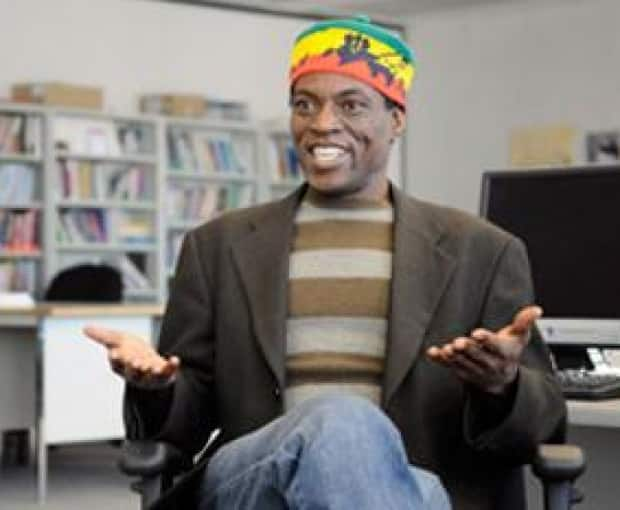'Everybody benefits from learning about Africa': U of C students advocate to expand African Studies program
Students at the University of Calgary are fighting to expand the school's African studies program.
For more than two decades, only two African studies courses have been available at the U of C, and for the past decade they've been taught by just one professor. Students say they hope an expansion of the program would mean more classes and more teachers.
Prof. Caesar Apentiik said it would make him very proud to see the program finally expanded.
"The university is trying to decolonize its curriculum, and decolonizing its curriculum means bringing into focus studies like African studies," he said. "This fits well with the university's strategic plan of trying to internationalize our students' degrees to give them a global perspective, and Africa is an important part of that discussion."
Student advocates looking to help the program grow are now applying for $300,000 through the Quality Money program — a partnership between the Students' Union (SU) and the university — which gives the campus community an opportunity to bring forward ideas to enhance the overall student experience.
"Each year, the SU is provided with approximately $1.67 million from the UCalgary board of governors to invest in these projects. Through this unique program, students have a direct say in how a portion of their tuition is spent," said students' union president Frank Finley in a written statement to CBC News.
"Since 2004, over $26,000,000 has been awarded to more than 260 Quality Money initiatives that range from physical space upgrades to the creation of expanded academic and professional opportunities for students."
Second year student Prudence Iticka with Black People United is one of the students behind the application to expand the African studies program.
Iticka said she became passionate about making this change after she inquired about getting a minor in African studies.
"When I went to look at the course offerings, I realized that there are only two courses offered in African studies every academic year," she said. "I reached out to the only professor in the department and I asked him, 'how does one actually major when there are so few courses available within this program?'"
Iticka said she was told that the way the program is now, that option simply isn't available.
"When I found that out, I started reaching out to other students within U of C to find out what we can do. How can we rally behind this program not only to save it, but also to expand it so that students can minor?" she said.

"Because right now you can't, really. You have to go to another school if you're seeking a minor in African studies because the course offerings here are just mediocre."
As an educator, Apentiik said it's been difficult telling students they can't major or minor in African studies, despite their interest.
"I will say that the saddest moment is to see your student struggling when they have genuine interest in a regional area and they can't minor in it," he said. "We anticipate that if we are able to achieve what we're trying to do now, it means that we'll have enough courses within the program and students can be assured that they will have enough courses if they make a decision to minor."
The expansion of the program is also something the U of C's African-Caribbean Student Association (ACSA) would like to see.
"By using the Quality Money application, we're able to hire more black professors to teach more African studies courses. That's something that the African Caribbean Student Association has been pushing alongside multiple other organizations on campus," said co-president Ganiyat Sadiq.
With their application due on Friday, Sadiq said student advocates are collecting all evidence of community support for the expansion of the African studies program.
"We have to get a lot of student support and community support just to show the university administration that it is something that is wanted on campus, too," she said.
Sadiq said a petition organized by ACSA has already garnered more than 1,000 signatures of support.
"We were able to show that there are over a thousand students that do want to have Africana studies courses and who do want to take those courses and would potentially want a minor in that degree. That's a primary thing we've been doing."
Iticka said the existing African studies courses offered at the U of C are already very popular.
"They're constantly wait-listed. The enrolment is incredibly healthy for those two courses," she said.
Iticka said offering more African studies courses isn't just something that students are showing they want, but also something she believes will have a big impact on the greater Calgary community.

"If we truly seek to develop the next generation of leaders, we have to give them a global perspective. This education is so necessary and we don't want people to think that we're doing this for African students," she said. "Everybody benefits from learning about Africa. We want people to understand that, you know, this is so much bigger than just the university."
Iticka said that since the death of George Floyd at the hands of Minneapolis police in May, the U of C has made a lot of statements about anti-racism but she hasn't seen a lot of concrete steps to make change at the school.
"For now, we've just seen that it's a lot of lip service that is being paid to dismantling structural racism and tackling racism and discrimination, but there is actually nothing that is being done so far," she said.
"We believe that you can actually tackle racism and undo its harm through education, because a lot of the unconscious bias and the stereotypes that a lot of people have about Black people comes from the fact they know nothing about Black people, about Black history, about African history," she said.
"We can combat this unconscious bias. We can combat these stereotypes with proper education about African people, where they come from, what is their contribution to humanity [and by] seeing Black professors and having black professors in their life."
In a written statement to CBC News, the U of C's faculty of arts said that while it is too early to know what the outcome of the Students' Union process for selecting Quality Money recipients will be, the faculty is supportive of the student-led application for Quality Money funds to expand course offerings in African studies.
"The faculty has committed to providing some additional funds, in the event of a successful application, and in order to hire an instructor of African studies for the next three years," said Richard Sigurdson, dean of the faculty of arts.
The funding amount from the faculty will be determined following the decision by the Students' Union about the application, as they may choose to offer partial funding or the full amount requested.
Recipients of Quality Money will be informed in April 2021.
For more stories about the experiences of Black Canadians — from anti-Black racism to success stories within the Black community — check out Being Black in Canada, a CBC project Black Canadians can be proud of. You can read more stories here.


